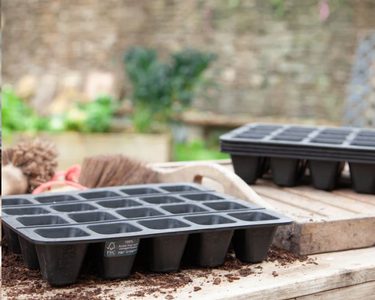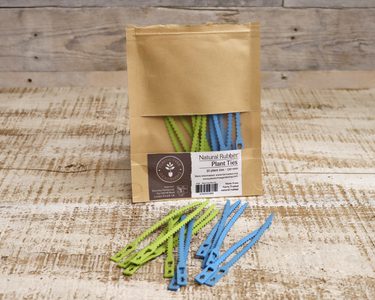Is rubber a sustainable plastic alternative in the garden?

So you’ve decided to try to reduce plastic in your garden…but what are the best alternatives?
Rubber, especially natural rubber, can be a more sustainable option than plastic for a variety of reasons. Plastic is derived from petroleum, a non-renewable resource, and contributes to long-lasting environmental pollution due to its inability to biodegrade. Most plastics take hundreds of years to break down, and as they do, they shed microplastics that can harm wildlife and ecosystems.
In contrast, natural rubber is harvested from rubber trees (Hevea brasiliensis), making it a renewable resource. The trees themselves absorb carbon dioxide from the atmosphere, contributing to carbon sequestration, which helps offset some of the environmental impact. Rubber is also more biodegradable than plastic, though it doesn’t break down as quickly as other natural materials like wood. Still, when sourced sustainably, rubber offers a significantly lower environmental footprint than plastic.
In gardening, switching to rubber products can reduce the plastic waste generated by tools and containers that are often made from single-use or short-lifespan plastic. Natural rubber is durable and long-lasting, making it a reliable choice for items that will be used year-after-year.
Sustainable vs unsustainable rubber: what’s the difference?
While rubber has the potential to be sustainable, it’s important to know that not all rubber products are environmentally friendly. The key difference lies in how the rubber is sourced and processed. Sustainable rubber is typically harvested in a way that does not deplete or damage the forests from which it comes. It ensures that rubber trees are tapped responsibly, without leading to deforestation or harming biodiversity.
By contrast, unsustainable rubber production can contribute to deforestation, habitat destruction, and the exploitation of local communities. This is particularly concerning in regions like Southeast Asia, where natural rubber is primarily grown. Without careful management, rubber plantations can encroach on rainforests and other critical habitats.
When choosing rubber products for your garden, it’s crucial to look for sustainably sourced rubber, which is where FSC certification comes in.
How FSC certification ensures sustainability
The Forest Stewardship Council (FSC) is an international certification body that promotes responsible management of the world’s forests. FSC certification ensures that rubber is sourced in an environmentally and socially responsible way. When you buy FSC-certified rubber (or wood) products, you can trust that the materials comes from well-managed plantations that protect biodiversity, reduce environmental impacts and support the rights of workers and local communities.
FSC certification also prevents illegal logging and ensures that forests can regenerate and continue to provide essential services, such as carbon sequestration, wildlife habitat and soil protection. In essence, choosing FSC-certified rubber products for your garden means supporting sustainable practices and reducing your environmental impact.
Five sustainable swaps to make in 2025
Ready to make the switch? Here are five sustainable swaps to help save you money while saving the environment.
1. Rubber seed trays
Have you noticed how quickly plastic seed trays can become flimsy and break? Sometimes it can happen after just a couple of uses. A rubber seed tray is a great alternative. It’s sturdy while being supple, making it easy to remove seedlings once they’re ready for transplanting.
2. Veggie seed markers
Plastic seed markers often become lost in the soil once plants start to mature, taking a lifetime to eventually degrade. Wooden seed markers solve this problem, being made from an entirely natural material. These veggie sticks provide a visual reminder of exactly what’s growing in your patch.
3. Wool twine
Whether for staking plants or securing trellises, twine is a gardening staple. Instead of plastic-based options, try eco-friendly alternatives like wool. Providing the farmer uses organic farming practices and has excellent animal welfare standards, wool is one of the most planet-friendly fabric options readily available as a twine alternative, being recyclable, renewable and biodegradable. Try Twools twine, which is available in a range of colours to suit your garden palette on our website.
4. Recycled plant pots
Plant pots are one of the most common forms of plastic in the garden. How many plants have you bought that come in a plastic starter pot? Like plastic seed trays, these pots are often flimsy, and sometimes contribute to the single-use plastic problem. Instead, try recycled plastic pots, which are often manufactured to last years and can be used again-and-again.
5. Organic netting
Many veg crops need protection from pests and harsh weather, but plastic covers have a high carbon footprint. Organic cotton is a great substitute, and much better for the environment than conventionally produced cotton, as it protects soil and waterways by eliminating toxic substances from the production process.
Competition time!
We’ve teamed up with The Wildlife Community to offer five packs of its rubber plant ties! Simply email the Latin name of the rubber tree, and your name, email and phone number before 31 July, to [email protected] – and we’ll pick a winner.

Visit the Wildlife Community website to find some of these plastic free products. If you’re a member of Garden Organic you will also receive a 10% discount on any Wildlife Community products. You can also follow them @thewildlifecommunity and @plasticfreegardening on social media.